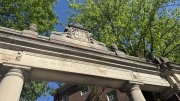In his installation address on October 12 and in a subsequent talk to alumni 15 days later, President Lawrence H. Summers emphasized that efforts to bring the University community together intellectually and otherwise, and scientific research and education, would be two themes of his administration. Matching action to agenda, on October 29 he announced the appointment of Steven E. Hyman, M.D. '80, as provost, Harvard's second-ranking academic and executive officer. Hyman was scheduled to begin work on December 10, shortly after this issue went to press.
Hyman's career is the archetype of scientific curiosity and boundary-crossing. A 1974 Yale graduate in philosophy and the humanities, he then journeyed to the University of Cambridge as a Mellon Fellow in the philosophy of science, earning B.A. and M.A. degrees. After earning his M.D., he became an intern in medicine at Massachusetts General Hospital (MGH), a resident in psychiatry at McLean Hospital, and a postdoctoral fellow in molecular biology. At Harvard Medical School (HMS) he rose to become professor of psychiatry, directing the school's division on addictions from 1992 to 1995 as well as psychiatry research at MGH from 1992 to 1996. Ranging widely across Harvard, too, he was also the first faculty director of the interdisciplinary mind/brain/behavior program (see "Mind, Brain, and Behavior," November-December 1994, page 36).
In 1996, Hyman was appointed director of the National Institute of Mental Health (NIMH), where he has overseen a scientific staff of 1,000, some 300 administrators, and an annual budget of $1.2 billion. Among his priorities there, he cited "research that links information about basic biological and genetic processes to research on behavior," with the goal of moving information "as quickly as possible from the laboratory to new clinical uses and to strategies for preventing mental disorders." He has also emphasized "enormously expanded research on how to improve the effectiveness of current treatments for several major mental disorders" in clinical settings, including bipolar disorder, schizophrenia, Alzheimer's disease, and depression. An NIMH colleague said, "Steve did great things here for those with mental disorders by blending scientific opportunity with public-health needs."
As a public spokesman on mental health, Hyman drew on all the tools in his pedagogical portfolio. In 1997 testimony on the neurobiological bases of pain, fear, and severe mental illness, for example, he told a U.S. House of Representatives subcommittee, "The French philosopher, René Descartes, who crystallized the very bad idea that mind and body are radically distinct, has been dead for 347 years." Proceeding systematically to bury the dichotomy, Hyman explained, "Psychotherapy works...because, like medicine, it works on the brain." He advocated public education and continuing research to overcome the "confusion and fear and shame" associated with mental illness.
As NIMH director, Hyman also remained active in the lab. He has been investigating the molecular basis of gene expression in neurons within the brain--work at the intersection of biology, neuroscience, genetics, and psychiatry. (Research is a family pursuit: he is married to Barbara E. Bierer, also M.D. '80, formerly professor of pediatrics at HMS and director of pediatric stem-cell transplantation at Dana-Farber Cancer Institute and Children's Hospital. Of late, she has been laboratory chief for lymphocyte biology at the National Heart, Lung, and Blood Institute. The couple have three presumably scientifically literate children.)
Summers called Hyman "an outstanding scientist, an admired educator, and a creative organizational leader" with a "deep commitment to vigorous, interdisciplinary pursuits." As such, he said, the new provost will be "an energetic leader in stimulating both cooperation and innovation," fostering intellectual collaboration across Harvard, "helping assure the highest quality of academic appointments and educational programs," and setting University priorities.
During a brief interview on the day he was appointed, Hyman said running NIMH was "analogous to being dean of a school" at Harvard in creating opportunities for scholars and researchers to pursue their work. Asked about possible links between the Faculty of Arts and Sciences and researchers in the medical complex, he saw "enormous rewards for increased cooperation" between the "enormous pools of talent on both sides of the river." Much as NIMH basic scientists and clinical investigators found partnership "mutually enriching," he said Harvard scientists were conducting research in fields that "demand cooperation and collaboration." He was encouraged about the prospects, because participants in the mind/brain/behavior initiative have already found that "they needed each other" to tackle basic questions.
More generally, he said, he envisions the provost as "making sure that Harvard is in a position to address intellectual" problems that might not be apparent if seen "only within traditional boundaries." For example, thinking seriously about the events of last September 11 would require the Harvard community to call on its expertise in economics, religion, politics, and history. Anything less would "impoverish our ability to grapple with it."
On another of the president's highest priorities, undergraduate education, Hyman dismissed the efficacy of "top-down pressure" from Massachusetts Hall. Instead, he hopes to work closely with Summers and members of the College to adapt the curriculum to rapid changes in knowledge. In this vein, he sounded the president's theme of equipping nonscientists to understand science, even as it becomes "increasingly specialized, arcane, and difficult."
One key to change in the College, of course, will be faster growth in the faculty ranks. Harvard's multitiered appointments process ultimately runs through the president's office. Would the provost pick up some of that burden? It was too soon to answer definitively, Hyman indicated. But he also suggested a spirited willingness to overcome choke points: "Both [the president and I] believe the most important thing is that Harvard, without compromising standards for professorial appointments, make them fairly and efficiently," he said, and not be hamstrung by "too conservative a process." >





